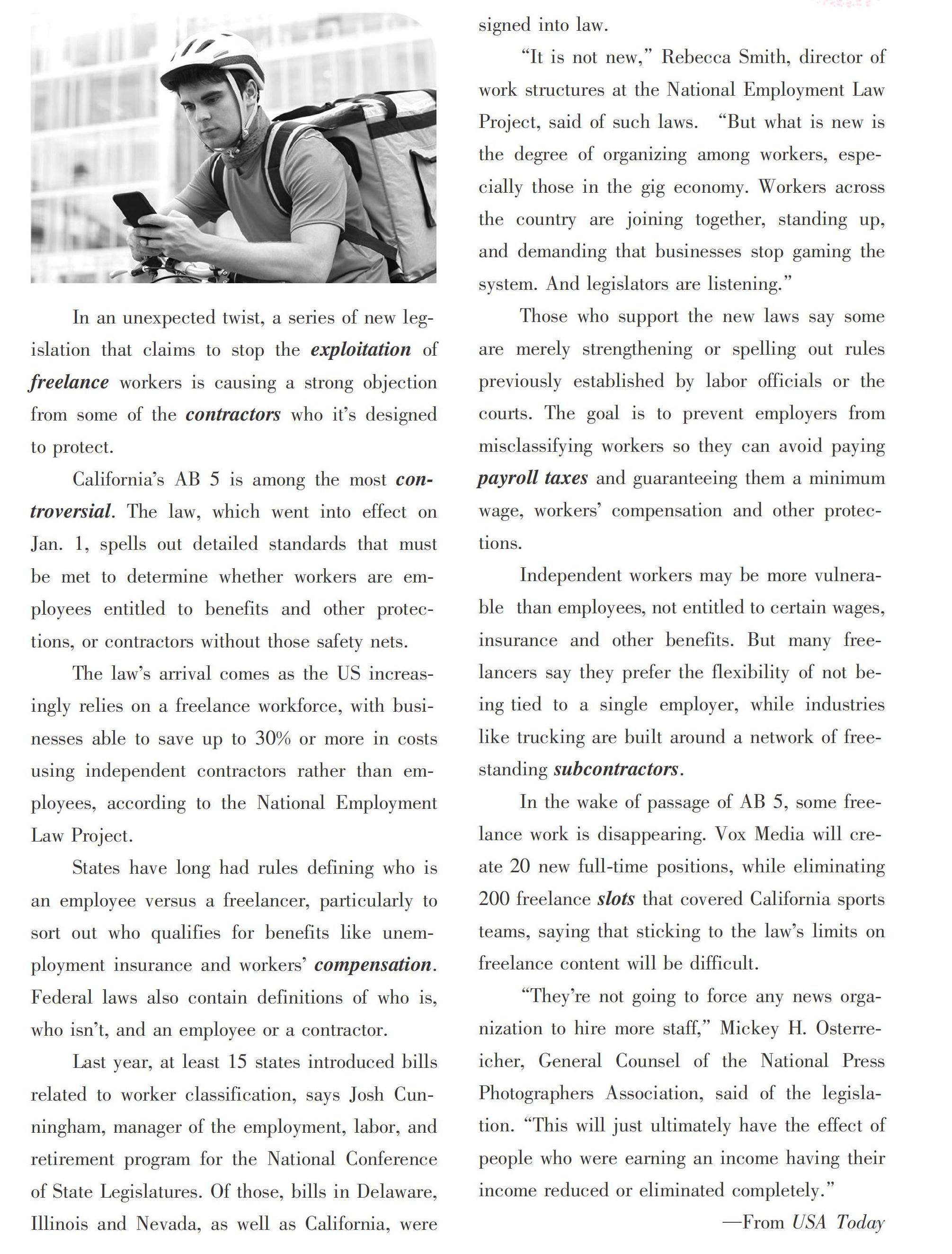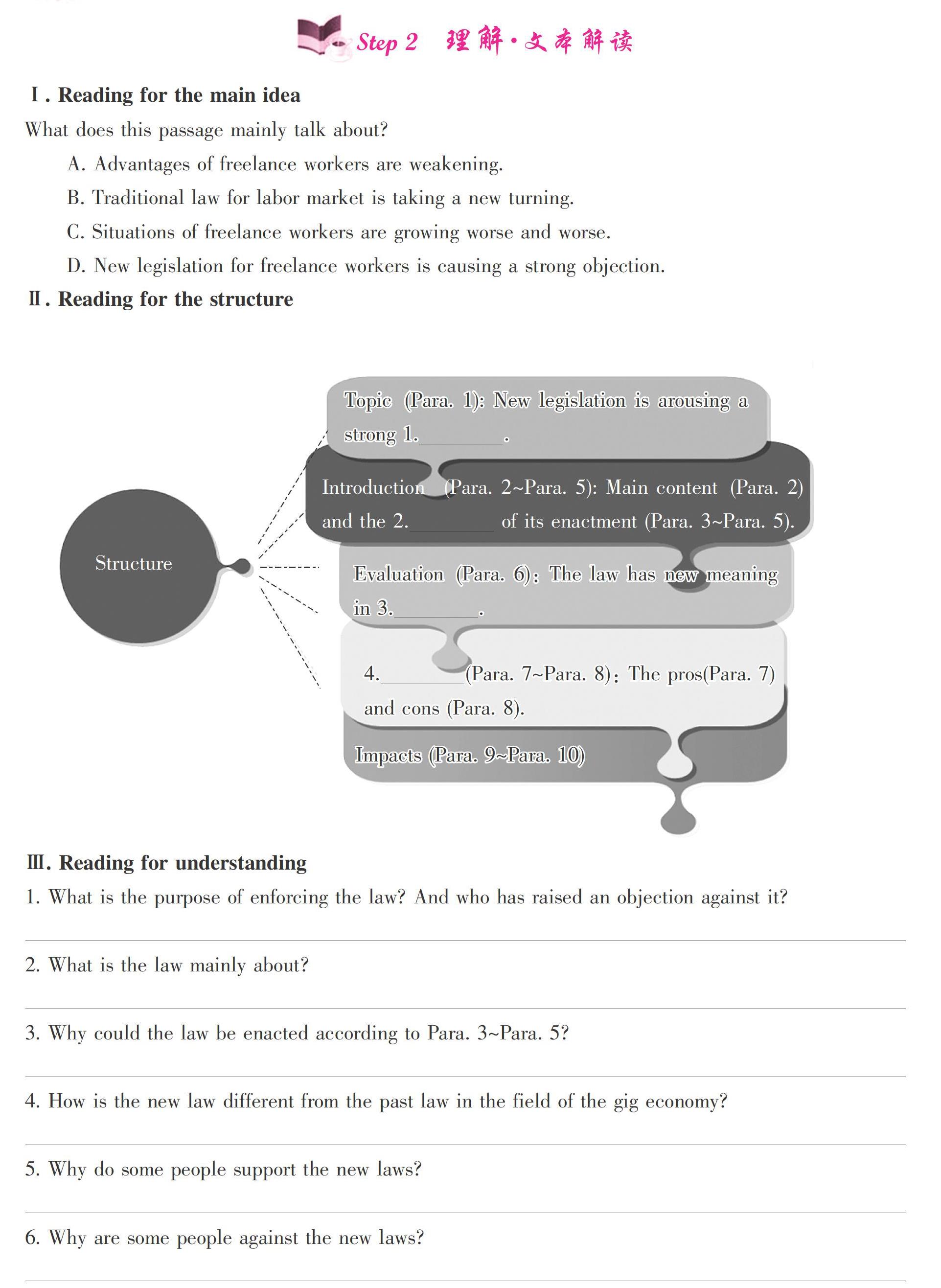Could laws designed to protect gig workers actually hurt them?保护“网约工”的法律引发争议
2020-06-29陈志强
陈志强



Step 1 感知·阅读导航
随着共享经济的蓬勃发展,“网约工”开始涌入劳动市场。“网约工”并不是一个专门的工种,而是指那些通过互联网平台为消费者提供服务的劳动者群体的统称,其中比较有代表性的就是我们熟知的快递小哥、外卖骑手、代驾司机、上门厨师等。
随着这一群体的规模越来越大,这一群体与互联网平台之间产生的劳动纠纷也越来越多。多数“网约工”处于一种尴尬的境地:他们与互联网平台之间的法律关系过于模糊,很难维护自己的合法权利。这就导致“网约工”一旦出现意外工伤或劳动损伤,他们的合法权益难以得到保障。
为保护“网约工”的权益,美国加州议会最近颁发了包括第5号议案在内的一些法案。但这些法案却由于自身的漏洞而饱受争议。本文就此进行了分析。
本文是一篇议论文。全文约446词,建议用时8分钟。
1. 理清文章的基本结构,明确议论文的一般框架。
2. 区分文章的事实与观点,掌握作者通过例证和引用阐明观点的方法。
3. 能够对文章的主要信息进行提取、概括与整合,以读促写,读写结合。
4. 思考在共享经济环境下,“网约工”面临的机遇、挑战和困境,以及保护“网约工”合法权益的基本措施。
阅读扫障
1. exploitation /?謣ekspl?蘅?奘?謖te?奘?蘩n/ n. 利用;剥削
2. freelance /?謖fri?蘼lɑ?蘼ns/ adj. 自由職业(者)的
3. contractor /k?藜n?謖tr?覸kt?藜(r)/ n. 承包人;承包商;承包公司
4. controversial /?謣k?鬑ntr?藜?謖v?誻?蘼?蘩l/ adj. 有争议的;引起争议的
5. compensation /?謣k?鬑mpen?謖se?奘?蘩n/ n. 赔偿金;补偿金
6. payroll tax 薪资税;工资税
7. subcontractor /?謣s?蘧bk?藜n?謖tr?覸kt?藜(r)/ n. 分包人;分包商
8. slot /sl?鬑t/ n. 位置;机会
In an unexpected twist, a series of new legislation that claims to stop the exploitation of freelance workers is causing a strong objection from some of the contractors who it?蒺s designed to protect.
California?蒺s AB 5 is among the most controversial. The law, which went into effect on Jan. 1, spells out detailed standards that must be met to determine whether workers are employees entitled to benefits and other protections, or contractors without those safety nets.
The law?蒺s arrival comes as the US increasingly relies on a freelance workforce, with businesses able to save up to 30% or more in costs using independent contractors rather than employees, according to the National Employment Law Project.
States have long had rules defining who is an employee versus a freelancer, particularly to sort out who qualifies for benefits like unemployment insurance and workers?蒺 compensation. Federal laws also contain definitions of who is, who isn?蒺t, and an employee or a contractor.
Last year, at least 15 states introduced bills related to worker classification, says Josh Cunningham, manager of the employment, labor, and retirement program for the National Conference of State Legislatures. Of those, bills in Delaware, Illinois and Nevada, as well as California, were signed into law.
“It is not new,” Rebecca Smith, director of work structures at the National Employment Law Project, said of such laws. “But what is new is the degree of organizing among workers, especially those in the gig economy. Workers across the country are joining together, standing up, and demanding that businesses stop gaming the system. And legislators are listening.”
Those who support the new laws say some are merely strengthening or spelling out rules previously established by labor officials or the courts. The goal is to prevent employers from misclassifying workers so they can avoid paying payroll taxes and guaranteeing them a minimum wage, workers?蒺 compensation and other protections.
Independent workers may be more vulnerable than employees, not entitled to certain wages, insurance and other benefits. But many freelancers say they prefer the flexibility of not being tied to a single employer, while industries like trucking are built around a network of freestanding subcontractors.
In the wake of passage of AB 5, some freelance work is disappearing. Vox Media will create 20 new full?鄄time positions, while eliminating 200 freelance slots that covered California sports teams, saying that sticking to the law?蒺s limits on freelance content will be difficult.
“They?蒺re not going to force any news organization to hire more staff,” Mickey H. Osterreicher, General Counsel of the National Press Photographers Association, said of the legislation. “This will just ultimately have the effect of people who were earning an income having their income reduced or eliminated completely.”
—From USA Today
Step 2 理解·文本解讀
Ⅰ. Reading for the main idea
What does this passage mainly talk about?
A. Advantages of freelance workers are weakening.
B. Traditional law for labor market is taking a new turning.
C. Situations of freelance workers are growing worse and worse.
D. New legislation for freelance workers is causing a strong objection.
Ⅱ. Reading for the structure
Ⅲ. Reading for understanding
1. What is the purpose of enforcing the law? And who has raised an objection against it?
_________________________________________________________________________________
2. What is the law mainly about?
_________________________________________________________________________________
3. Why could the law be enacted according to Para. 3~Para. 5?
_________________________________________________________________________________
4. How is the new law different from the past law in the field of the gig economy?
_________________________________________________________________________________
5. Why do some people support the new laws?
_________________________________________________________________________________
6. Why are some people against the new laws?
_________________________________________________________________________________
7. What might the new laws bring about?
_________________________________________________________________________________
【点石成金】任何体裁的文章都有其内在的逻辑与层次关系,把握了这一关系,同学们就可以理清文本脉络,准确理解文本的深层含义。在阅读不同体裁的文章时,同学们应注意文章对中心话题的阐释,形成有效的问题链。本处设置的七个问题,涉及法案的制定目的、内容、背景、特点,人们对它的评价、态度,以及该法案的影响等,通过回答这些问题,同学们就可以比较清晰地认识这个新法案。明确信息提取与整合过程中的目标也为后续的语言输出做了较好的铺垫。在回答问题时,同学们应注意适当改变文中的原句,进行必要的转述。
Step 3 运用·读写整合
Reading for writing
Supposing you are a freelancer, you are interviewed by a journalist about your attitude towards the new law. What would you say about it?
_________________________________________________________________________________
_________________________________________________________________________________
【点石成金】读写整合的重点就是以阅读为语言输入形式,在写作过程中输出语言,坚持输入和输出的一致性。紧扣阅读的话题,设计写作任务,这能够给学生足够的支架或铺垫,能够保证阅读文本中出现的重点词汇的运用。
情境是学生核心素养培育的途径和方法,是实现核心素养的现实基础。教师在教学过程中创设情境就是构建课程知识内容与学生的生活、经验、情感和生命的连接纽带。教学中所创设的情境要贴近学生的生活,并使得学生能够在所创设的情境中运用所学知识解决实际问题。
Step 4 提升·素养建构
一、阅读微技能:Facts and opinions
在阅读议论文时,我们需要区分文章的观点和事实。观点通常是作者的态度或看法,是文章的核心信息;而事实是用来佐证文章论点的论据,是支撑性信息或细节性信息。
A fact: A fact is a truth. A fact is a statement of truth that can be verified and is able to be proven as true. It is known to have happened or to exist, especially something for which proof exists, or about which there is information.
An opinion: An opinion is a statement that reflects an author?蒺s or the speaker?蒺s point of view, beliefs, perspectives, personal feelings, and values; opinions cannot be verified and proven to be true or false. However, a person?蒺s opinion can be supported or refuted(驳斥) when a critical thinker who is a critically thinking reader of a text scrutinizes(仔细审查) and critically evaluates the author?蒺s opinions, beliefs, perspectives, personal feelings and values, and these opinions are based on documented, valid and reliable facts.
Fill in the table below with an F if it is a fact or an O if it is an opinion.
二、中国外卖小哥因“非凡使命感”登上《时代周刊》封面
用一些“网约工”自己的说法,“社保福利无人管,抽成罚款不手软”是他们过去的生活写照。然而,逆境之下,总有一些“网约工”成为最美的逆行者。3月19日,美国《时代周刊》发布抗疫群像,美团外卖骑手高治晓作为唯一华人面孔登上封面。《时代周刊》在封面上对高治曉的介绍语为:
Beijing
Gao Zhixiao, 32,
a delivery driver who has continued working as the virus spreads across China.
《时代周刊》还引用了高治晓的话,以盛赞他的高度责任感。
“I felt a sense of responsibility because I manage a team of other riders, and some were still working in Wuhan, so I had to help them.”
3月17日,MSN官网转发此文,赞扬高治晓。
拓展阅读:P23 Delivery drivers during the coronavirus epidemic; P54 Time—a worldwide news magazine
